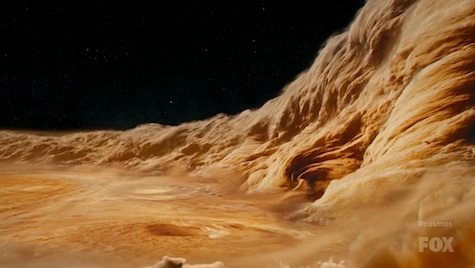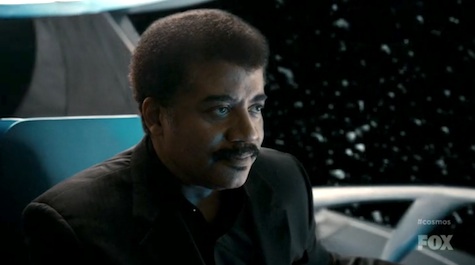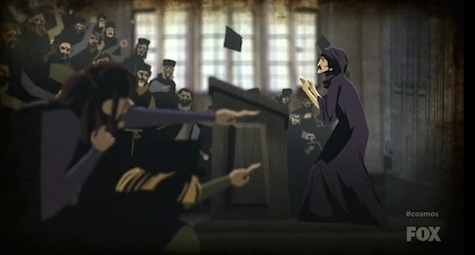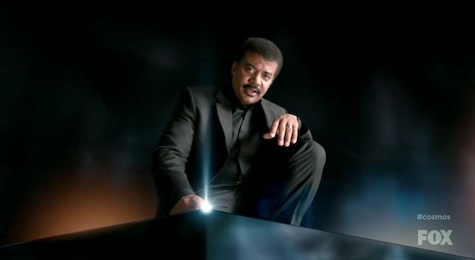It’s funny; I didn’t expect to be the wrong audience for Cosmos: A Spacetime Odyssey.
I love space. It’s vast and full of dramatic extremes and it contains every story there is to tell. All you have to do is get me in the right mood (re: brunch) and I’ll relay how we could build a warp drive right now if we only had a type of matter that doesn’t exist, or how disappointed I’ll be if we don’t find evidence before I die of an exoplanet actively harboring life.
To be sure, Neil deGrasse Tyson’s renewed Cosmos mini-series conveys that same awe and excitement clearly and gorgeously. But its debut episode “Standing Up In the Milky Way” certainly made me feel alone in the universe, in ways both intended and not.
That was definitely the desired effect of Tyson’s “cosmic address” sequence, which introduced our narrator, his ship of the imagination, and the dazzling visuals that we all hoped a 21st century Cosmos could provide. As readers and fans of science fiction, we’ve grown up with interstellar vistas by Ron Miller, Ludek Pesek, Chesley Bonestell, and so many more facing out at us from our bookshelves. These vibrant windows of possibility join images from the Hubble telescope and other probes in showing us a universe that surrounds us with color and texture. And now, Cosmos: A Spacetime Odyssey gives us a way to sail through these static images in a way that we will never get to realize in our lifetime. Jupiter’s cliff-faces of clouds soaring higher than the Earth itself… The moon assembling from bits of our own planet… The eternal blizzard of Saturn’s rings… This new Cosmos can make the sheer audacity of our stellar backyard real in a way that Sagan himself could not.

But even as we the viewer learned what our cosmic address is, I felt a growing frustration with the sequence. The show zips furiously through our solar system and into the universe beyond it, and at every stop I kept waiting for Tyson to drop one more tidbit of knowledge, one more extra something that would make me want to explore further on my own. Wasn’t he going to explain why Mercury doesn’t simply drop into the sun? Would he let us know that mankind is unable to construct a probe that can last on Venus for more than a few minutes before it melts? We see the moon forming from the Earth, but how do we know that’s what happened? He zips right by Uranus and Neptune, then sits pensively while he approaches Pluto, the very planet he demoted. (Okay, not really.)

Tyson didn’t need to explain everything, of course, but there was an element of excitement missing for me as he recited facts that I already knew. The facts are astonishingly visualized, but aside from little bits about rogue planets and the first animal to walk on the surface of the Earth, the generalized overview we receive in “Standing Up In the Milky Way” isn’t all that different from one of the shows at Tyson’s own Hayden Planetarium.
It’s this reaction that gave me pause, however. Just because I know this doesn’t mean that everyone else does. Worse yet, part of my assumption that everyone around me already has this knowledge is driven by the personal frustration that I feel when this becomes apparent. I recently took a college science course where I discovered that the majority of the students didn’t even know how many planets we had in our solar system, or what they were called. This is such an important thing to know, I wanted to scream. Did you never wonder where you are? It’s times like this when you feel truly (and somewhat pedantically) alone in the universe.
Thankfully, I didn’t scream that (or anything at all) and the class continued onwards. The students left with a wider understanding of Earth, our solar system, and their place within the universe, unencumbered by any of my unthinking outrage.
Wanting to be tyrannical about knowledge is a weird place to find yourself in. Your own urge to tear down boundaries to learning suddenly becomes more destructive than constructive, and you end up turning away those who yearn to discover more. You become a hoarder, a barrier, the very thing you’d been striving to move past. Those who are just beginning to test their curiosity look to you for guidance and see a face that judges instead of a welcoming smile. It’s a situation not all that uncommon from the animated depiction of Giordano Bruno that the episode presents.

Cosmos’ real brilliance lays in avoiding this trap and Spacetime Odyssey does so gloriously in its premiere episode. Before we can really dig into the universe around us, we need to know what it is, and how long it took for us to get here, and that’s exactly what “Standing Up In the Milky Way” provides. Without judgment. Without cynicism. Without weirdos like me yelling, “BUT TELL THEM HOW WE KNOW ROGUE PLANETS EXIST BECAUSE IT IS TEH AWESOM!!!”
That striving for inclusivity is what makes A Spacetime Odyssey a truly worthy successor to Carl Sagan’s Cosmos. It honors Sagan’s life in showing you that knowledge you may have always thought was out of reach is actually a part of your day to day life. That you know more than you think. That you can choose to believe that you’re alone in the universe, but that you’re very much not.
We’re all on this journey together. And thanks to Cosmos: A Spacetime Odyssey, we’re on our way again.
Dwarf planets:
- President Obama taped an intro for the show! That’s quite a “get” for the universe. You can watch it here:
- I go back and forth on the animation style in the show. It looked like a puppet show in comparison to the CONSTANT HD BEAUTY of the cosmos, but the more I think back on it the more I like it. The “bowl of stars” in particular was so fittingly dreamy.
- Point Lobos! I just went there for the first time over this past Christmas so I’m jazzed to have possibly scampered over the same rocks as Neil and Carl.
- If our awareness of our own cosmos lasts only 14 seconds on the cosmic calendar it makes you wonder if that’s just how it goes in a universe this big. (If we only get 14 seconds, that is.) As if the timeline of all existence is patched together with a billion billion instances of 14 second windows casting about for their neighbors and always finding themselves too late or too early…
- Check out the upcoming episode titles. I want to read every single one of those novels.
- How amazing was Neil’s story of going to Carl Sagan’s house as a boy?
Chris Lough wouldn’t one-way it to Mars but would drop his life savings to take a trip into space. But first he has to get life savings. Find him on Twitter.











When I visited London 20 years ago, I couldn’t quite convince my guide (my older brother) to visit the botanical garden that Sagan did. I wanted to go there–because Carl did.
It’s promising so far, but the ratio of flash to substance was a little high for me, and some of the astronomical depictions were too inaccurate (like the ridiculous cliche of the asteroid belt as a dense Empire Strikes Back-style clutter). As for the rushed pacing and somewhat superficial coverage, keep in mind that the first episode of the original Cosmos did something similar, presenting an overview or thesis statement of the series as a whole and then delving more deeply into specific topics in subsequent weeks. I expect the same will be true here. But I suppose a faster pace is only to be expected if the series is to appeal to a modern audience, let alone one watching commercial television.
Tyson was a pretty good presenter — not quite as lyrical and soulful as Sagan, but effective and polished, and with a marginally similar vocal timbre to Sagan’s. And that bit at the end about how Sagan inspired him helps establish his bona fides as Sagan’s successor.
There are things I miss from the original series. It’s hard to imagine Cosmos without Vangelis’s music. Alan Silvestri’s score is grand enough but kind of conventional, without as much personality as the original’s mix of stock cues ranging from electronic music to classical symphonies to traditional folk songs.
And very, very little of what we saw was real. The original had terrific effects for its day, but it also spent a lot of time showing us real people and places and objects, and that gave it more of a sense of presence and tangibility. This was mostly CGI and cartoons and a guy on a greenscreen stage, and I’m concerned that might make it less relatable.
Still, it did a good job establishing the mission statement: that science is about questioning assumptions and beliefs, building models, and accepting or rejecting them based on the evidence rather than tradition or preconceptions, and that using that method has revealed profound truths that we had no inkling of before. (Although I think it was a little Eurocentric here and there — Copernicus wasn’t the first person to conceive of heliocentrism, but was preceded by Aristarchus and various medieval Muslim scholars. Copernicus was just the first to embrace and develop the idea fully.) And I could see the political subtext in the Giordano Bruno story — allegory for how reactionary and fundamentalist thinking in America today is threatening the freedom of scientific thought and education.
The use of animation for historical narratives was an interesting addition to the visual repertoire of Cosmos, but I felt it got a bit too reliant on dramatization and dialogue rather than a narrator’s summary. As with some of the space VFX, there were times when it threatened to undermine plausibility and factual accuracy a bit too much in the name of dramatic effect. But for the most part it worked pretty well, although I’m not a big fan of Flash animation and the way things move in it.
The really surprising thing to me was that Brannon Braga was credited not merely as an executive producer, but the director of the episode and one of the series directors. I’ve never known him to direct before, and as of this writing he has no director credits on IMDb.
We were talking about this a lot this morning. One of the office-mates was watching with his son. He was able to pause the show and discuss some of the concepts with him. Complicate the concepts a little more. Which if it can get people like my parents more interested in science, I’d be more than pleased.
Cosmos is definitely meant for those learning about the universe, not those who have already been studying it for a long time. It’s purpose is to make more future scientists, after all!
I thought it was beautiful and Neil was a fantastic presenter as always. I liked the juxtaposition of the CGI universe (extremely well done!) and the more “puppet-like” stylization of the historical sequences. They worked well together, and I very much enjoyed them. Again, the show is targeted towards the younger crowd, and it does so without being patronizing, imo. It’s great.
Some thoughts:
Like Chris, I felt a little left out. I know this stuff (except the name of the amphibian). So why I am still watching it?
I was really hoping to see more real images. I subscribe to NASA’s image of the day, and contextually, those are a lot better than CGI images.
It was just a little “empty” for me. Something was missing, and I cannot quite put my finger on it.
I liked the animations. Took me back to when I was reading “Black holes in my bubble bath“.
Why not a real scientist or astronaut to do the intro? Thematically would have been a better fit.
I was not engaged with Tyson’s presentation. It felt like he was talking to someone else, and not me. It is the same feeling I used to get in a class with a lecturer who would talk to the board/computer and not to the class.
I hope the future episodes will take some time to delve a little into topics rather than continue with this high-level approach. A lot of material was covered, but all very superficially.
I have not spoken to my parents about it yet. My father is familiar with what was presented; my mother less so. Maybe that will answer our questions about the target audience.
I was also hoping they would show some of the internal workings of the telescopes they talked about; Voyager they showed; etc, but that could be the engineer in me talking.
I wonder how Sagan would feel about the near-adulation everyone heaps on him?
(and yes, his show and books inspired me as well)
It’s early episodes, people. This is the first paragraph of the cosmic term paper, when you summarize what you’re going to say. They can’t show you everything at once. Digging down for details will come in later episodes. There’s twelve more of them.
@5: How is Neil DeGrasse Tyson not a “real” scientist? Because he’s on TV? He’s got a Masters and a Doctorate in Astrophysics. The definition of “scientist” is “a person who is studying or has expert knowledge of one or more of the natural or physical sciences.” I’d say a doctorate qualifies.
I rather liked the first episode. The pretty pictures were very pretty, whether it was the CGI zipping through the solar system or the nicely stylized animation of Bruno’s story, and that’s a definite draw for me. It wasn’t telling me anything shockingly new, but I enjoyed a nice coherent summary of the basics with nice visuals.
But the nine-year-old watching in the room with me? She was actively asking questions of her parents while the show went through. What did that word mean? Why is it like that? What are they going to do to Bruno? (Nothing good, kid.) Why? And at the end of the episode, she declared that she totally wanted to watch the next episode, too.
I figure that’s the target audience, and boy, is that audience being reached. So while I find it a nice enough show to watch as I have access, I think they’re doing a damn fine job so far.
@7: I did not say Tyson is not a real scientist. Can you clarify your comment, please?
As for creating new scientists, it seems to be doing a pretty good job:
https://www.youtube.com/watch?v=fiZUIgnSzQE
@7: I think that maheshkb was suggesting that the introduction by President Obama could’ve been done by a scientist or astronaut instead. In answer to that question, I thought it was good seeing the President make the intro, because he’s right — America does need a generation excited by science again if we’re to continue to contribute meaningfully to science and innovation in the future, and there’s a strong anti-intellectual, anti-science faction that’s gained far too much influence over American thought and policy in the decades since the original Cosmos. For me, at least, it was heartening to see the President of the US standing behind science education at a time when so many in Congress and state legislatures want to pretend the Book of Genesis is the only science lesson anyone needs.
I enjoyed the episode. Some stunning visuals for a TV science program. And Tyson makes a good enough host. Although, I think it would be nice if he dropped the grandiosity a little in future installments, maybe inject a little more humor. Tyson did seem to talk at me instead of to me at times with Cosmos, and I know by listening to his Startalk radio program he can be a funny, down-to-earth guy.
In my opinion, overall it’s not quite as good as Morgan Freeman’s Wormhole series, but it has a great deal of potential. Looking forward to more.
Regarding President Obama’s appearance: As someone who has many family members who are part of the “anti-science” crowd, I think his appearance probably turned them off. To them, it likely played into their beliefs that much of science has become politicized. I often talk science with them, and they aren’t so much anti-science, just anti anything they perceive to be politicized against them.
I got the feeling the show was for children. Which is great, because I remember watching the original with my father and we had some good discussions from it, so I hope lots of kids experience the same thing. But it really wasn’t for me.
The last time I watched a show like this and was enthusiastic about it was Brian Cox’s Wonders of series. He has such enthusiasm and peppers the standard spiel with enough intriguing facts that you don’t need all the special effects to stay interested.
Since it was quite like the original, I cannot but like the first episode of Cosmos. I look forward to more journeys with Dr. deGrasse Tyson.
ChristopherLBennett (@3): I, too, winced a bit at the visual “clutter” of the asteroid belt, as well as that of the Oort Cloud. Considering how Dr. deGrasse Tyson publicly moaned to James Cameron about the incorrect starfield above the sinking ship in Titanic, I wonder how he feels about his own show making some inaccurate “eye candy”.
@15: Well, once he got to the Oort Cloud, Tyson did say that we could never actually see it as it appeared because its constituents were so enormously far apart. So at least there, an attempt was made to underline that the visuals were more symbolic than literal. The point could’ve been made more emphatically, though. Maybe it will be in a future episode.
Cosmos is and has always been about how science should be shared with everyone.
So why isn’t it available ouside the US?
as someone who watched & thoroughly enjoyed Sagan’s original, i honestly think Dr. Tyson, Seth McFarlane & friends have been true to the spirit of the overall idea which is to get kids & everyone **excited**
about ———–and interested in critical thinking about—–the cosmos & our own part of it///in it.
Especially after watching that video ((posted above by Cybersnark >>
https://www.youtube.com/watch?v=fiZUIgnSzQE ) >>
well…………… that puts it in perspective eh?
IF most of our media was as dedicated to the attitudes & quality that the new Cosmos has somehow brought to mainstream Tv, then i think we’d have a more intelligent &
open minded culture. That’s the bottom line IMHO.